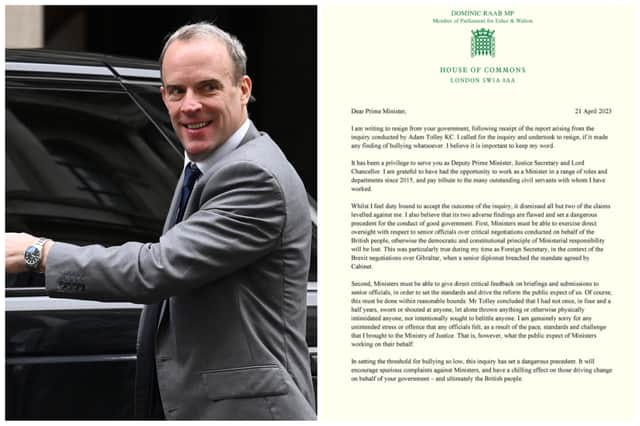Dominic Raab found to be ‘intimidating’ and ‘persistently aggressive’: 5 key points from bullying report
and live on Freeview channel 276
Deputy prime minister Dominic Raab resigned on Friday morning (April 21), after a key report into his behaviour towards staff. The investigation was undertaken by lawyer Adam Tolley KC, who published a 47-page document on his findings.
Dominic Raab has repeatedly denied the accusations, saying he behaved professionally at all times in government and in line with the ministerial code. After resigning from his post as Deputy Prime Minister and Justice Secretary, Raab published a ‘damning’ 1,100-word essay in the Telegraph criticising the ‘flawed’ report.
Advertisement
Hide AdAdvertisement
Hide AdThe lengthy investigation took five months as Mr Tolley independently looked into eight accusations of bullying from the former Deputy Prime Minister. Two of these claims of bullying were upheld as part of the investigation.
We’ve collated five key points from the report which highlight some of the findings made by the investigation.
Five key points from report into Dominic Raab’s bullying
1. ‘Intimidating’
Adam Tolley KC’s investigation found that Dominic Raab acted in an “intimidating” fashion during his time as part of the Ministry of Justice. The report finds that Raab’s behaviour blurred the line between ‘critical feedback’ and ‘insulting’ behaviour.
2. ‘Undermining’ and ‘humiliating’
Mr Tolley added that Dominic Raab ‘must have been aware’ that his conduct was being perceived as ‘undermining or humiliating by the affected individual’. The report notes that Raab’s behaviour was ‘punitive’ and ‘went beyond what was reasonably necessary’.
3. ‘Persistently aggressive’
Advertisement
Hide AdAdvertisement
Hide AdThe report investigated Raab’s behaviour in the context of a work meeting while he was in the Foreign Office. It noted: “He acted in a way which was intimidating, in the sense of unreasonably and persistently aggressive conduct in the context of a work meeting.” Adam Tolley’s report also said: “His conduct also involved an abuse or misuse of power in a way that undermines or humiliates.
“In particular, he went beyond what was reasonably necessary in order to give effect to his decision and introduced a punitive element. His conduct was bound to be experienced as undermining or humiliating by the affected individual, and it was so experienced. I infer that the DPM must have been aware of this effect; at the very least, he ought reasonably to have been so aware.”
4. ‘Utterly useless’ and ‘woeful’
The 47-page report identified an instance where Raab highlighted the absence of “basic information” from staff. He described some work as “utterly useless” and “woeful” while at the Ministry of Justice. Adam Tolley said there was a stark dispute over whether the deputy prime minister had described work as above, but he said that “on balance, I think these were the words used.”
He added: “...they comprised criticism that was not in the nature of constructive feedback. They were reasonably understood as insulting personal criticism.”
5. ‘Unacceptable’ physical gestures
Advertisement
Hide AdAdvertisement
Hide AdIn the report, Mr Tolley notes he heard a ‘good deal’ of evidence suggesting Raab used physical gestures in communication with some cases pertaining to be ‘unacceptable’.


Mr Tolley writes: “At the most extreme, and which would have been unacceptable, this was put as extending his hand directly out towards another person’s face with a view to making them stop talking.”
Another example cited Raab banging on a table to emphasise a point.
